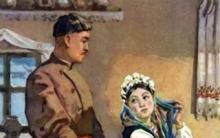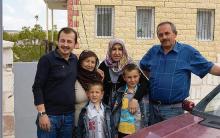The action takes place in a small provincial town Kalinov on the banks of the Volga in summer. We learn about this at the very beginning of the play. Both the time of year and the place are of great importance. At the beginning of the first act we see Kuligia looking at the Volga and admiring its beauty. In any work, especially a dramatic one, there are not and cannot be trifles. Everything that the author pays attention to is of great importance.
Even with a superficial reading of Ostrovsky’s drama “The Thunderstorm”, one can pay attention to the fact that descriptions of nature are very common. Already in the title of the drama is reflected a natural phenomenon- storm. In the drama, the strength and beauty of nature is, as it were, contrasted with a stuffy and cramped society in which “cruel morals” reign. For example, Kuligin calls Kalinov a “lousy little town,” but he also emphasizes that there is wonderful nature here.
The description of nature is not only and not so much the background that is necessary for staging drama on stage. The description of the landscape is necessary in order to demonstrate the wretchedness of people's lives. Kuligin says that people are not happy with wonderful nature; City residents walk extremely rarely, only on holidays. After all, the poor have no time to walk, and the rich hide behind fences.
It seems that the only advantage of the small provincial town of Kalinova is its beautiful nature. The human world is rude, cruel and unpleasant. But nothing can spoil the beauty and grandeur of the Volga River, next to which the city is located. Katerina loved nature since childhood. She says: “If it were up to me, I would now ride along the Volga, on a boat, with songs, or in a good troika”... In her mind, fun is closely connected with nature, with walks, with joy. In the city, people are forced to live in an atmosphere of outdated orders and a gloomy mood. People like Kabanikha and others like her do not pay the slightest attention to nature. They have no need to enjoy the beauty of the landscape. After all, nature cannot be conquered or enslaved. Therefore, they “hide behind the fences,” tyrannizing their family.
Anticipating the approach of a thunderstorm, Katerina begins to suffer from a feeling of helplessness and defenselessness. Only such an impressionable nature as she can feel the superiority of the forces of nature. People seem so weak compared to the mighty elements. But the people around Katerina do not have such a developed imagination, so they cannot compare themselves with the world of living nature.
The harmonious connection between Katerina and nature is obvious. Katerina says: “ Why do people don't fly like birds? You know, sometimes I feel like I'm a bird. When you stand on a mountain, you feel the urge to fly. That’s how she would run up, raise her hands and fly...” A bird is part of nature, and it is no coincidence that Katerina compares herself with this free creature. The bird can fly wherever it wants, unlike the unfortunate woman who is forced to sit locked up according to house-building orders.
Romantic and impressionable, Katerina always knew how to see the beauty of nature. When she remembers her happy childhood, she talks about caring for flowers, and there were “many, many of them.” Katerina says little about the people who surrounded her in childhood; she remembers only her loving and caring mother. And this is no coincidence, communication with people was of little interest to the girl; flowers were much more important, closer and clearer to her. The beauty of the garden, flowers, river - this is Katerina’s world before marriage. After the wedding everything changed. Now the girl can only remember her past happiness.
When Katerina was little, she was once greatly offended. She ran away to the Volga and got into a boat. The girl was found only in the morning, about ten miles away. This episode also shows a connection with wildlife - offended girl seeks salvation not from people, but from the river. Katerina - true folk image, harmoniously and naturally connected with nature. It’s hard to imagine Dikiy, Kabanikha and others like them walking on the Volga, enjoying the beauty of the flowers in the garden. But Katerina, on the contrary, is difficult to imagine high fence unable to see the beauty of the world around. The drama takes place in the hot summer. And this is also not accidental. After all, in the summer, more than ever, a person can feel his inextricable connection with nature, can enjoy its beauty, grandeur, and strength. In summer, freedom is especially needed, which the main character of the drama is deprived of.
By the attitude of the characters in the drama to nature, one can judge their spiritual qualities. For Katerina, nature is a part of herself. Kuligin also admires the beauty of the world around him. He says that he cannot stop looking at the beauty of nature all his life. This characterizes Kuligin and Katerina as sublime, romantic, emotional natures. The other characters in the drama are completely different. They perceive the world around them as ordinary. And therefore they seem even more miserable and gloomy. They are afraid of natural phenomena. For example, when Kuligin tells Dikiy about the need to install lightning rods in the city, the latter shouts that a thunderstorm is a punishment that is sent from above. From Kuligin’s point of view, a thunderstorm is “grace”, because every blade of grass rejoices, and people have “made a scarecrow” for themselves and are afraid of them. But those around him are more inclined to believe the Wild One rather than Kulngin.
Many writers have depicted the scene of lovers meeting against the backdrop of nature. When Katerina and Boris meet, it is an amazingly beautiful summer night. And this detail cannot escape the reader’s gaze, because in this way the author shows the harmony of relations between people and the world around. True, this harmony is fragile. Very little time passes, and Katerina is convinced that she has committed a serious crime.
Katerina hears conversations around that during a thunderstorm someone will definitely be killed or the house will catch fire. The girl is sure that the thunderstorm was sent as a punishment for her, and it will kill her. During a thunderstorm, Katerina repents of what she did and admits to treason. A thunderstorm as a natural phenomenon perfectly matches a woman’s mood. She is confused, afraid, does not know how and where to look for salvation. And the nature around is also in turmoil; the storm made the world around us unusual, alarming, and scary. All this has the most powerful effect on the exalted Katerina. in a strong way. In addition, she sees a fresco in the church, which depicts a picture of hell. Isn’t all this enough to drive an impressionable woman to the point of insanity... The thunderstorm in Ostrovsky’s drama is both a natural phenomenon and a symbol of Katerina’s painful mental suffering.
Katerina had long since mentally said goodbye to life. Now all she has to do is finish the job. In those moments when Katerina talks about her torment, it rains. Nature seems to be crying with her, grieving and pitying the unfortunate one. But Katerina does not receive sympathy from people, except that Kuligin is trying to evoke mercy in the weak and weak-willed Tikhon. The Volga River, which Katerina has loved since childhood, accepts her without asking whether she was a sinner or a righteous woman during her life. Death in the waves of the river seems to Katerina a lighter punishment than the trial of people.
1. Life in a provincial town.
2. Lively and rebellious character main character.
3. The role of nature in the play.
A. N. Ostrovsky in the play “The Thunderstorm” shows how in small town on the banks of the Volga, tragic events unfold. From the very first lines of the work, we learn about the atmosphere in which the heroes of the play happened to live. There are no trifles in the work; any, even seemingly insignificant detail has important. And in this context, we must not forget that it is not by chance that the writer indicates the time of year and the place where the tragedy occurred. The city is located on the banks of the great Russian river Volga. Already at the very beginning of the first act, this was said through the mouth of Kuligin. A self-taught inventor looks at the Volga and talks about its beauty. This detail shows that an intelligent and extraordinary person understands beauty surrounding nature, able to enjoy it. The people around them do not think about this, which indicates their limitations, lack of craving for beauty and, finally, emotional deafness.
The main character of the play, Kabanova, appears completely different. Only she, unlike all other people, is able to understand, appreciate, and feel the main dignity of her hometown - beautiful nature. Katya is able to admire the beautiful landscape for a long time; she has loved nature since childhood. In the world of people, a young woman feels extremely uncomfortable; people around her are rude and cruel. Katerina lacks bright, fresh impressions. She is suffocating in a suffocating atmosphere of lies, stupidity, and hypocrisy. Katerina says: “If it were up to me, I would now ride along the Volga, on a boat, with songs, or in a good troika”... And the point here is not at all that she is drawn to entertainment, forgetting about everyday affairs. In fact, a young, emotional woman wants something bright and beautiful in her life. But there are only gloomy faces and strict orders around. Those around them are not able to appreciate the beauty of nature around them; they are concerned only with everyday affairs, boring, like their whole life. Nature in the play has its own life, radically different from the life of people, beautiful, fresh, free. Nature cannot be conquered. Katerina is very similar to her in this.
A thunderstorm is approaching - a bright, noticeable and strong natural phenomenon. And the main character seems to sense the approach of a thunderstorm, so much does she suffer from the cramped and narrow world of the “dark kingdom”. Katerina is defenseless and helpless in the face of the anger and hatred of others. She is impressionable, tender, dreamy. And she, in essence, has nothing to oppose to people like Kabanikha, rude, undeveloped people. Katerina is harmoniously connected with nature. She dreams of flying: “Why don’t people fly like birds? You know, sometimes I feel like I'm a bird. When you stand on a mountain, you feel the urge to fly. That’s how I would run up, raise my hands and fly…” Such words indicate that Katerina does not have enough freedom to break out of the Domostroev order. As a child, Katya happily looked after flowers. She remembers exactly this, and not at all about the people who once surrounded her. Katerina was not interested in people, although her parents loved and spoiled her. The natural world was more interesting for the girl than the human world. She spent a long time admiring the garden and the river. The wedding became for her turning point, after which life changed for the worse. The emotional deafness of her husband, cruelty, stupidity and hypocrisy of her mother-in-law make the girl unhappy. All that remains from the previous life are memories and the beauty of the surrounding nature, which remains the same as before.
Katerina remembers how in childhood, after a strong insult, she ran away to the Volga, got into a boat... She was found only the next day, far from that place. It is not by chance that the girl runs to the river, but does not at all try to find solace from people, even from her family and friends. A harmonious connection with nature shows an extraordinary nature, even if it is incomprehensible to others.
It is difficult for us to imagine that Kabanikha could admire the picture of the Volga landscape, because she appears as the complete opposite of the romantic and sensitive Katerina. There are practically no people like Katya in the town. The only exception is Kuligin, who, like Katya, cannot get enough of the beauty around her.
The beauty of nature is very important to Katerina. It is no coincidence that the tragedy happened in the summer, when it appears before people in all its glory. It was in the summer that Katerina especially acutely felt her loneliness and her lack of freedom, which made her so unhappy.
Katerina perceives the beauty and grandeur of nature through the prism of her dreamy nature. She lives for this beauty, she can't imagine own life without her. People around are so accustomed to the Volga landscape that it seems only a backdrop for everyday life. Everyday life. Moreover, those around them are afraid of this nature, they sense a hidden danger in it. For example, he is afraid of thunderstorms and considers them a punishment from above. Kuligin, on the contrary, is happy about the thunderstorm, says that every blade of grass is happy, and people scare themselves. But Dikoy and others like him “scare” themselves for a reason. In fact, they are afraid of everything that is beyond their control, including natural phenomena.
Ostrovsky depicts the meeting of Boris and Katerina against the backdrop of a summer night. In fact, Katerina's love for Boris became the highlight of her joyless life. It seems to Katerina that she has finally found her happiness. The relationship between lovers is actually harmonious, at least that is the impression that readers get. But the idyll turned out to be just an illusion.
People around Katerina say that a thunderstorm portends misfortune - someone's death or a fire. The woman is in a panic, she thinks that heaven intends to punish her for the sin she committed. And the thunderstorm will only kill her. Under the influence of such thoughts, Katerina admits that she cheated on her husband. Against the backdrop of a thunderstorm, her recognition gains special meaning. A thunderstorm broke out in nature; and the same “thunderstorm” in social sense became the betrayal of a timid, submissive wife. During a thunderstorm, nature becomes unusual and scary. This fits Katerina’s mood perfectly. She thinks that she has no forgiveness and goes crazy. The thunderstorm in this case, as it were, personifies Katerina’s suffering, which led her to suicide. Life is no longer pleasant to her. Katerina no longer thinks about anything. It's raining like beautiful world sheds her tears around, sympathizing with the unfortunate woman. Katerina sees no pity from people. Only the free Volga River accepts the body of the sufferer into its waves.
So what is the significance of the picture of the Volga landscape in the play? We see mention of him very often. Without a doubt, the power, grandeur and beauty of nature are contrasted by the author with the “dark kingdom” where the main character was not lucky enough to live. “Lousy little town,” as Kuligin Kalinov calls it, in spite of everything, is located in most beautiful place. However, this dignity of the city does not make anyone happy; on the contrary, it only emphasizes the wretchedness of people’s lives. Nature becomes one of the main characters in the play, it is necessary for the reader to realize the shortcomings human relations depicted in the work.
Role minor characters, everyday background and landscape in the play by A.N. Ostrovsky "Thunderstorm"
I. Introduction
The introduction of minor characters into the play, the depiction of everyday background and landscape enable the author to expand the scope of what is depicted, to show the environment in which the action unfolds, and to create a certain emotional flavor in the work.
II. main part
1. Minor characters:
a) Wild. He is not directly involved in the plot of the play. The function of this character is to embody with maximum clarity the features of the “cruel morals” of the city of Kalinov, to give the reader and viewer an idea of militant tyranny;
b) wanderer Feklusha. Her stories show all the ignorance of the inhabitants of the city, their hypocrisy and active rejection of everything new;
c) Kuligin. The role of this character is approximately the same, although Kuligin himself is completely opposite to Feklusha. Kuligin represents science and enlightenment in the play. In his ideas, however, there is nothing particularly new, but even these ideas (for example, the lightning rod) are met with misunderstanding and contempt. In addition, Kuligin is a man of much more sublime thoughts than his environment (feels nature, reads poetry, etc.). It is he who expresses thoughts close to the author’s (especially after Katerina’s suicide).
d) Kudryash and Varvara. This pair of characters is closely connected with the motif of freedom, both external and internal. Due to certain circumstances and character traits, they were able to contrast their own independence with the tyranny of the tyrants. However, it is impossible to pin any serious hopes on them for changes in the world of tyrants: they live one day at a time, not caring at all about the future.
2. Household background. It is partly associated with such minor characters as Dikoy and Feklusha. Another way to introduce everyday background into the play and at the same time expand the scope of what is depicted is through the stories of the characters (Kuligin, Boris, Dikiy, etc.), from which we learn about the features of the “cruel morals” of the inhabitants of the city. The everyday background reveals in the play an atmosphere of tyranny, ignorance, rudeness and arbitrariness. It creates in the reader and viewer the impression of a stagnant life, contrary to any free speech and freedom in general; The everyday background aggravates the tragedy of the main character’s situation.
3. The landscape performs the opposite function in the play. The action takes place in a Volga town, and the Volga has long been associated in the minds of Russian people with freedom, with will. It is in the Volga that Katerina finds a unique and only possible liberation for her. Kuligin speaks more than once about the beauty of the Volga nature, but no one understands him. Thus, nature acts as a contrast to “ cruel morals»life of the city of Kalinov.
4. The image of a thunderstorm is somewhat more complex. If for Kuligin this is a natural phenomenon that he sincerely admires, then for others a thunderstorm is a manifestation of God’s wrath. Katerina feels this way too; Her repentance is connected with the thunderstorm.
1. Life in a provincial town.
2. The lively and rebellious character of the main character.
3. The role of nature in the play.
A. N. Ostrovsky in the play “The Thunderstorm” shows how tragic events unfold in a small town on the banks of the Volga. From the very first lines of the work, we learn about the atmosphere in which the heroes of the play happened to live. There are no trifles in the work; any, even seemingly insignificant detail is important. And in this context, we must not forget that it is not by chance that the writer indicates the time of year and the place where the tragedy occurred. The city of Kalinov is located on the banks of the great Russian river Volga. Already at the very beginning of the first act, this was said through the mouth of Kuligin. A self-taught inventor looks at the Volga and talks about its beauty. This detail shows that an intelligent and extraordinary person understands the beauty of the surrounding nature and is able to enjoy it. The people around them do not think about this, which indicates their limitations, lack of craving for beauty and, finally, emotional deafness.
The main character of the play, Katerina Kabanova, appears completely different. Only she, unlike all other people, is able to understand, appreciate, and feel the main advantage of her hometown - the beautiful nature. Katya is able to admire the beautiful landscape for a long time; she has loved nature since childhood. In the world of people, a young woman feels extremely uncomfortable; people around her are rude and cruel. Katerina lacks bright, fresh impressions. She is suffocating in a suffocating atmosphere of lies, stupidity, and hypocrisy. Katerina says: “If it were up to me, I would now ride along the Volga, on a boat, with songs, or in a good troika”... And the point here is not at all that she is drawn to entertainment, forgetting about everyday affairs. In fact, a young, emotional woman wants something bright and beautiful in her life. But there are only gloomy faces and strict orders around. Those around them are not able to appreciate the beauty of nature around them; they are concerned only with everyday affairs, boring, like their whole life. Nature in the play has its own life, radically different from the life of people, beautiful, fresh, free. Nature cannot be conquered. Katerina is very similar to her in this.
A thunderstorm is approaching - a bright, noticeable and strong natural phenomenon. And the main character seems to sense the approach of a thunderstorm, so much does she suffer from the cramped and narrow world of the “dark kingdom”. Katerina is defenseless and helpless in the face of the anger and hatred of others. She is impressionable, tender, dreamy. And she, in essence, has nothing to oppose to people like Kabanikha, rude, undeveloped people. Katerina is harmoniously connected with nature. She dreams of flying: “Why don’t people fly like birds? You know, sometimes I feel like I'm a bird. When you stand on a mountain, you feel the urge to fly. That’s how I would run, raise my hands and fly...” Such words indicate that Katerina does not have enough freedom to break out of the Domostroev order. As a child, Katya happily looked after flowers. She remembers exactly this, and not at all about the people who once surrounded her. Katerina was not interested in people, although her parents loved and spoiled her. The natural world was more interesting for the girl than the human world. She spent a long time admiring the garden and the river. The wedding became a turning point for her, after which life changed for the worse. The emotional deafness of her husband, cruelty, stupidity and hypocrisy of her mother-in-law make the girl unhappy. All that remains from the previous life are memories and the beauty of the surrounding nature, which remains the same as before.
Katerina remembers how in childhood, after a strong insult, she ran away to the Volga, got into a boat... She was found only the next day, far from that place. It is not by chance that the girl runs to the river, but does not at all try to find solace from people, even from her family and friends. A harmonious connection with nature shows an extraordinary nature, even if it is incomprehensible to others.
It is difficult for us to imagine that Kabanikha could admire the picture of the Volga landscape, because she appears as the complete opposite of the romantic and sensitive Katerina. There are practically no people like Katya in the town. The only exception is Kuligin, who, like Katya, cannot get enough of the beauty around her.
The beauty of nature is very important to Katerina. It is no coincidence that the tragedy happened in the summer, when nature appears before people in all its glory. It was in the summer that Katerina especially acutely felt her loneliness and her lack of freedom, which made her so unhappy.
Katerina perceives the beauty and grandeur of nature through the prism of her dreamy nature. She lives by this beauty and cannot imagine her own life without it. People around are so accustomed to the Volga landscape that it seems only a background for ordinary everyday life. Moreover, those around them are afraid of this nature, they sense a hidden danger in it. For example, Dikoy is afraid of thunderstorms and considers them a punishment from above. Kuligin, on the contrary, is happy about the thunderstorm, says that every blade of grass is happy, and people scare themselves. But Dikoy and others like him “scare” themselves for a reason. In fact, they are afraid of everything that is beyond their control, including natural phenomena.
Ostrovsky depicts the meeting of Boris and Katerina against the backdrop of a summer night. In fact, Katerina's love for Boris became the highlight of her joyless life. It seems to Katerina that she has finally found her happiness. The relationship between lovers is actually harmonious, at least that is the impression that readers get. But the idyll turned out to be just an illusion.
People around Katerina say that a thunderstorm portends misfortune - someone's death or a fire. The woman is in a panic, she thinks that heaven intends to punish her for the sin she committed. And the thunderstorm will only kill her. Under the influence of such thoughts, Katerina admits that she cheated on her husband. Against the backdrop of a thunderstorm, her recognition takes on special significance. A thunderstorm broke out in nature; and the betrayal of a timid, submissive wife became the same “thunderstorm” in the social sense. During a thunderstorm, nature becomes unusual and scary. This fits Katerina’s mood perfectly. She thinks that she has no forgiveness and goes crazy. The thunderstorm in this case, as it were, personifies Katerina’s suffering, which led her to suicide. Life is no longer pleasant to her. Katerina no longer thinks about anything. It is raining, as if the beautiful world around is shedding its tears, sympathizing with the unfortunate woman. Katerina sees no pity from people. Only the free Volga River accepts the body of the sufferer into its waves.
So what is the significance of the picture of the Volga landscape in the play? We see mention of him very often. Without a doubt, the power, grandeur and beauty of nature are contrasted by the author with the “dark kingdom” where the main character was not lucky enough to live. “Lousy little town,” as Kalinov calls Kuligin, despite everything, is located in a beautiful place. However, this dignity of the city does not make anyone happy; on the contrary, it only emphasizes the wretchedness of people’s lives. Nature becomes one of the main characters in the play; it is necessary for the reader to realize the shortcomings of human relationships depicted in the work.
Plays by A. N. Ostrovsky “The Thunderstorm” and A. P. Chekhov “ The Cherry Orchard"are different in terms of issues, mood, and content, but the artistic functions of the landscape in both plays are similar. The load that the landscape bears is reflected in the titles of the plays. In Ostrovsky and Chekhov, the landscape is not only a background, nature becomes an active character, and in Chekhov the cherry orchard is one of the main characters. In both plays, the landscape is amazingly beautiful, although it is difficult to compare the breathtaking views of the Volga, which open from the place where the city of Kalinov is located, with a cherry orchard, small compared to the great Russian river. The huge, colorful Volga landscape is overwhelming with its beauty, harsh and powerful. Against its background, a person seems like a small insect, an insignificance compared to the vast, strong river. The Cherry Orchard is a secluded, calm corner, dear to the heart of everyone who grew up and lives here. He is handsome - handsome with that quiet, sweet, cozy beauty that so attracts a person to home . Nature has always had an influence on the souls and hearts of people, if, of course, their soul is still alive and their heart has not hardened. So, Kuligin, a very soft, weak, but kind and sensitive person, throughout his life could not get enough of the beauty of Mother Volga. Katerina, this one is pure and light soul , grew up on the banks of the Volga and fell in love with the river with all her heart, which was both her friend and protector in childhood. Ostrovsky's attitude towards nature was one of the criteria for assessing humanity. Dikoy, Kabanikha and other obedient subjects of the “dark kingdom” are indifferent to the beauty of nature, deep down they are afraid of it. The heroes of “The Cherry Orchard” - Ranevskaya, Gaev and everyone whose life for a long time was connected with the cherry orchard - they love it: the gentle, subtle beauty of the blossoming cherry trees left an indelible mark on their souls. The entire action of the play takes place against the backdrop of this garden. The Cherry Orchard is always invisibly present on the stage: they talk about its fate, they try to save it, they argue about it, they philosophize about it, they dream about it, they remember it. In Ostrovsky, the landscape also complements the action. Thus, Katerina’s explanation with Boris takes place against the backdrop of a beautiful summer night; Katerina repents during a thunderstorm in a dilapidated church, where of all the frescoes only a picture of hell has survived. For Ranevskaya and Gaev, the cherry orchard is a family nest, small homeland , where they spent their childhood and youth, here they were born and died out best dreams and hope, the cherry orchard became a part of them. The sale of the cherry orchard symbolizes the end of their life, from which only bitter memories remain. These people, who have magnificent, perfectly developed and educated, cannot preserve their cherry orchard, the best part of their lives. Anya also grew up in the cherry orchard, but she is still very young, plump vitality and energy, so she leaves the cherry orchard with ease, with joy, for her this is liberation, a step into new life. She strives to meet new life challenges, dreaming of planting new garden better than before. But in the old garden, in a boarded-up house, the forgotten old Firs was left to die. The Cherry Orchard does not let anyone go just like his past does not give a person peace. The cherry orchard is a symbol of life, a symbol of the past and future. He is immortal, just as life itself is immortal. Yes, it will be cut down, yes, dachas will be built in its place, but new people will plant new ones cherry orchards, and everything will start again. At the moment of Katerina’s repentance, a thunderstorm broke out and it began to rain, cleansing and washing away all sins. But people are not so merciful: “ dark kingdom"hunted the heroine who dared to break his laws. The Volga helped Katerina escape from an unbearable life among people and stopped torment and suffering. Gave me peace. Death in the Volga became a way out of the dead end into which Katerina was driven by human callousness and cruelty. The landscape in the plays of Ostrovsky and Chekhov emphasizes, among other things, the imperfection and pettiness of human relationships in the face of cold and beautiful nature.











Tsarevo █ Church of St. Nicholas the Wonderworker Tsarevo parish festive service June 05
Revival of the Sergius Church
Annexation of the Crimean Khanate to Russia Abolition of duties and the mint
Church of St. Dmitry the Myrrh-Streaming in the field
Group Bible Reading and Study Time of Voluntary Infirmity